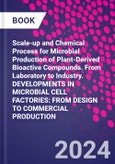Many plant-derived bioactive compounds are the foundation for drugs or effective drugs to cure diseases. Usually, the bioactive compounds in plant biomass are low, and the extraction of bioactive compounds from plants is not eco-friendly, which limits their application in drugs and other industries. While the biosynthesis of some complex bioactive compounds is possible, the scale-up and chemical process technology still needs further application in commercial production of the plant-derived bioactive compounds.
Scale-up and Chemical Process for Microbial Production of Plant-Derived Bioactive Compounds: From Laboratory to Industry summarizes recent commercial microbial production strategies for plant-derived bioactive compounds. This comprehensive summary will be of great interest to scientists and researchers, as well as engineers who work on the microbial production of plant-derived bioactive compounds in the industry.
Please Note: This is an On Demand product, delivery may take up to 11 working days after payment has been received.
Table of Contents
1. Advances and prospects for advanced biomanufacturing
2. Different microbial strategies used for industrial-scale production of plant-derived bioactive compounds
3. Optimization parameters for efficient scale-up of fermentation process
4. Development of economic extraction and purification process for plant-derived bioactive compounds
5. Screening and characterization of probiotics for large-scale production of plant-derived prebiotics
6. Designing and engineering synthetic microbiota to utilize plant lignin-based biomass for the synthesis of bioactive compounds
7. The principles to design and optimization of industrial bioprocesses
8. The synthetic probiotic microbiota and their potential applications in the production of plant-derived products
9. Fermentation utilizing engineered microbes: revolutionizing the production of commercial products from plant-derived bioactive compounds
10. Examples for successful commercial production of plant-derived bioactive compounds
11. Production of synthetic edible oils with engineered yeasts: from lab to commercialization
Authors
Yongjun Wei School of Pharmaceutical Sciences, Laboratory of Synthetic Biology, Food Laboratory of Zhongyuan, Zhengzhou University, Zhengzhou, China. Dr. Yongjun Wei, PhD, completed his bachelor's degree in biology at Shaanxi Normal University, China, before pursuing his PhD in microbiology from the Chinese Academy of Sciences (CAS) in 2014. Following his doctoral studies, he conducted a postdoctoral fellowship at the Chalmers University of Technology from 2014 to 2016. After that, he worked as an assistant researcher at CAS for a year before joining Zhengzhou University's faculty in 2018. Currently he serves as an associate professor at Zhengzhou University, Dr. Wei has published over 80 peer-reviewed papers and holds more than 20 patents. Furthermore, he serves as an editorial board member or youth editor for over 10 different journals. His research primarily focuses on microbial production of plant bioactive natural products and the utilization of microorganisms for disease treatment and pollution eradication. Xiao-Jun Ji NanjingTech University, National Engineering Research Centre for Biotechnology , Nanjing, China. Dr. Xiao-Jun Ji, PhD, is currently a professor of bioengineering and biochemical engineering at Nanjing Tech University (NanjingTech), China. He received his BSc and PhD degrees from NanjingTech in 2005 and 2009 and conducted the visiting research in the Systems and Synthetic Biology lab headed by Prof. Jens Nielsen at Chalmers, Sweden during 2016 and 2017. His recent research focuses on biomanufacturing pharmaceutical and nutritional chemicals using the nonconventional yeasts through the metabolic engineering and the emerging synthetic biology tools. He has many awards such as the Fok Ying-Tung Foundation Young Scholars Award (2014), the Hou De-Bang Chemical Youth Award of CIESC (2016), the National Technological Invention Award of China (2018), the Excellent Young Scholars of NSFC (2019), and the Newton Advanced Fellowships of the Royal Society (2020). Mingfeng Cao Department of Chemical and Biochemical Engineering, College of Chemistry and Chemical Engineering, Key Laboratory for Synthetic Biotechnology of Xiamen City, Xiamen University, Xiamen, China.Dr. Mingfeng Cao, PhD, is the Minjiang distinguished professor in the Department of Chemical and Biochemical Engineering, the director of the Institute of Bioengineering, and an honorary research fellow of the Tan Kah Kee Innovation Laboratory at the Xiamen Laboratory, China. He was awarded his PhD from the Nankai University in 2011, and between 2011 and 2013 worked as a research associate at the Tianjin Institute of Industrial Biotechnology, Chinese Academy of Sciences. He completed postdoctoral studies at Iowa State University, USA and was a research scientist at the University of Illinois from 2018 to 2021. His research focuses on the development of synthetic biology and metabolic engineering strategies to establish microbial cell factories for value-added and green chemical production. Dr. Cao has published over 60 journal articles and holds 10 patents. He also serves as the editor-in-chief of Biotechnology Reports and the associate editor for journals such as Microbial Cell Factories and Biotechnology for Biofuels and Bioproducts.








